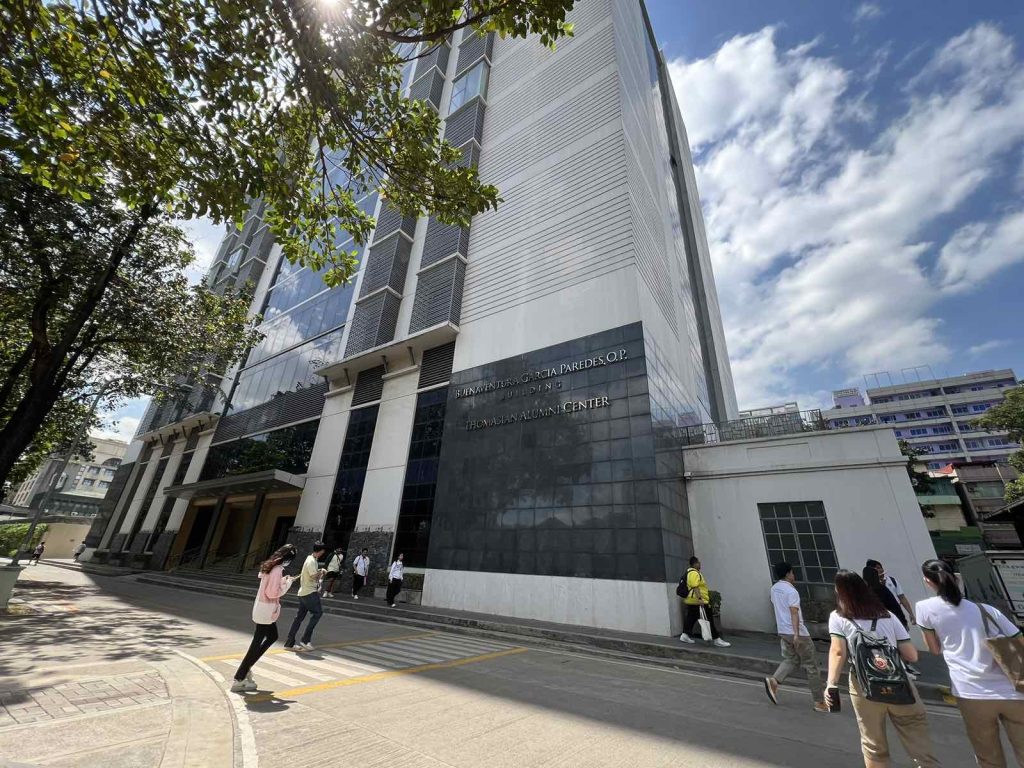
THE HEAD of the Journalism department said he was “constrained” to reallocate the teaching loads of non-tenured instructors who failed to comply with the Manila health permit policy to lessen the disruptions at the start of the new academic year.
Citing an email from the dean’s office, UST Department of Journalism chair Asst. Prof. Felipe Salvosa II said the submission of the health certificate was one of the requirements for the reappointment of part-time academic staff.
“Since one requirement was lacking, and there was no commitment conveyed of any intention to submit the health certificate before the July 31 deadline, I was constrained to not recommend their reappointments and reallocate the teaching loads to other faculty members instead,” Salvosa told The Flame.
Five part-time journalism instructors did not receive teaching loads for the first term of the academic year because they did not secure the health permit, which has been criticized by UST employees’ groups as “discriminatory” and “costly.”
“Even If I did recommend them, no reappointment would occur based on the established reappointment process,” Salvosa said.
“Thus, there is virtually no scenario in the reappointment process that will allow the well-intentioned request of ALFA (Arts and Letters Faculty Association) to let part-time, non-tenured faculty teach in UST under the circumstances mentioned in the request.”
Salvosa emphasized he had “very little to no discretion” over the submission of documents for teaching reappointment. As department head, he said he is tasked to implement policies of the UST administration.
“Otherwise, teaching loads and Canvas course sites will be left unassigned. I decided not to leave students without their course facilitators and course sites when there are options that will minimize, if not eliminate, disruptions at the start of the new Academic Year,” the journalism professor said.
Under the much-criticized City Ordinance 8793 or the Sanitation and Disinfection Code of the City of Manila, an employee has to pay P625 to obtain a health certificate, which must be renewed annually. Employees must present their valid ID, stools and urine samples, filled-out drug test form and biometrics from the Manila Health Department led by Arnold “Poks” Pangan, husband of Manila Mayor Honey Lacuna.
Meanwhile, tenured faculty members still received teaching assignments even if they did not obtain a health certificate since under the law, regular employees cannot be dismissed unless there is a just cause to do so. Practicing professionals also had the option to pay for a professional tax receipt (PTR) instead of a health certificate.
Following the non-reappointment of the part-time journalism teachers, ALFA urged Artlets Dean Prof. Melanie Turingan to allow non-compliant instructors in the college to teach while dialogues on the city ordinance are ongoing. The group argued that non-tenured faculty members “should be treated the same as PRC/IBP-licensed and tenured faculty” since the ordinance does not distinguish between different categories of workers at the university.
READ: Let non-compliant members teach pending talks on health permit policy, AB dean urged
The faculty association added that two days before the start of classes for this academic year, the journalism instructors who did not comply with the ordinance were informed by their department chair that they would not receive teaching loads.
Salvosa, however, clarified that faculty members were notified about the health permit requirement as early as April this year, when the Office of the Vice Rector for Finance (OVRF) released a memorandum directing all University staff to secure their health certificate from the Manila Health Department on or before May 31. The deadline was later extended to June 30 then July 31.
“The problem about the ordinance [is] it does not distinguish the tenured and non-tenured (faculty members). But it states [that] if you want to work in Manila, you need a health permit. That is unfair…I agree on that part,” Salvosa said.
“Kaso, batas iyon. Ang ordinansa parang republic act ‘yan pero sa jurisdiction ng Manila. Ngayon, kung tatanungin mo ako: yes, susundin ko iyon kahit hindi ito patas. Batas iyon eh, I cannot be a lawbreaker.”
(But, it is a law. An ordinance is like a republic act but in the jurisdiction of Manila. Now, if you will ask me, yes, I will comply with it even if it is not fair. It is a law, I cannot be a lawbreaker.)
Aside from sending reminders in faculty group chats and individual emails, the academic official said the following memoranda were also sent to all employees:
– May 20: Memorandum from the OVRF on the processing of and deadline extension for submission of health certificates or PTRs. Deadline extended to June 30.
– June 6: Memorandum containing additional clarifications from OVRF. The memorandum mentioned a June 30 deadline and also ordered an update of hiring policies to include the health certificate and PTRs.
– July 18: Memorandum and Frequently Asked Questions (FAQ) from the Office of the Secretary General with the deadline extended to July 31.
The FAQ document, which had the seal of UST, the Manila Health Department and Lungsod ng Maynila, included a section stating all University personnel who fail to submit a copy of their health certificate or PTR by July 31 would be blocked from accessing the University’s official online service.
READ: UST employees who fail to secure health permit to be locked out of MyUSTe portal
Earlier, the AB dean said the directive to comply with the Manila ordinance was made by the UST Office of the Vice Rector for Academic Affairs (OVRAA) and the OVRF.
“The mandate to implement the compliance is from the higher office. We just cascaded it to our chairs. I think a circular was spread regarding the non-compliance and its effect,” Turingan told The Flame in a previous interview.
According to the UST General Statutes, one of the functions of the academic affairs chief is to have “direct control and supervision over all the academic units of the University in relation to instruction and curriculum.” He or she also has direct supervision over the Office for Faculty Evaluation and Development and is “likewise responsible for ensuring the recruitment of academic personnel.”
Meanwhile, the duties of the vice rector for finance include assisting in the preparation of the annual budget in line with the department or section heads covering all activities of the University. His office also ensures the University complies with the requirements of certain agencies, including the local government unit of Manila.
“You cannot teach without an appointment because that is the basis of the salary. And that is the basis for issuing Canvas…assignment…If you do not have that (appointment) paper, you cannot teach because you will not earn your salary. If you teach, you cannot ask for a salary if you do not have an appointment,” Salvosa said.
“So there is no scenario that they (non-tenured faculty members) can teach in UST if they do not have a health permit.”
The Flame has reached out to OVRAA and OVRF for a statement about the issue but has yet to receive a response from both offices.
‘Unified stance’ sought
Asked how he hopes UST would address the Manila health permit issue, the department chair said he is seeking an outcome where “the University community comes around to a unified stance” on it.
“That means, working to have this ordinance repealed or modified, whether to totally remove this unnecessary requirement or modify it to make it easy for faculty members to comply,” Salvosa said.
“If it (requirement) can be removed, that would be better…but if the city council of Manila does not want to, maybe they can modify the ordinance to make it easy for UST employees to comply,” he added.
Pulitzer Prize-winning journalist Manuel “Manny” Mogato has urged UST to exempt non-tenured faculty members from the requirement.
“I hope UST will reconsider and exempt part-time teachers from getting a health certificate from city hall. It’s unfair to treat journalists as contractual and seasonal employees, like mall workers who will line up every five months to secure a work permit,” Mogato, who taught journalism subjects in UST, wrote in a Facebook post last Aug. 17.
Growing opposition to the ordinance has involved some employees’ concern over what they call “unhygienic” and “overcrowded” facilities of the Manila public health laboratory, where employees undergo processes, including the submission of stool and urine samples.
Last June, labor coalition Organisasyon ng Nagkakaisang Empleyado ng UST (ONE-UST) requested Lacuna to set up a satellite office within the University to accommodate the collection and testing of specimens and payment of fees, citing the discomfort that members faced “while collecting urine and stool samples in the below average conditions of the public toilets.”
Some UST employees also believe that the Manila city ordinance is an extortion scheme intended to “milk” workers. ONE-UST has expressed readiness to challenge the policy before the court.
Noting the efforts of other local government units to make workers in their establishments comply, Salvosa expressed optimism that the same would go for the University.
“For example, in [Quezon City], it isn’t like this. In Pasig, it isn’t like this. Because they have alternative means of compliance. So hopefully, the entire University community will agree with each other; that this is our collective stance,” the department chief said.
UST only addressed the controversy once when it issued a statement last Aug. 7 giving an assurance that it would meet the requirements of laws and policies, including ordinances from the city government. It did not specify the city ordinance but said it “ensures the implementation of relevant measures to achieve timely compliance alongside ongoing dialogues” with stakeholders.
So far, ONE-UST has not yet received a notice from the Office of the Rector on a meeting regarding the employees’ concerns over the health permit. F



